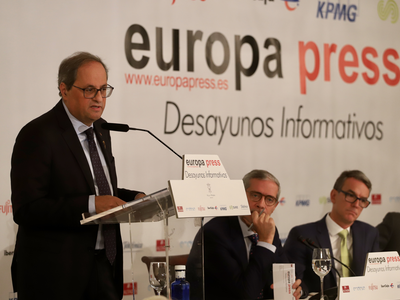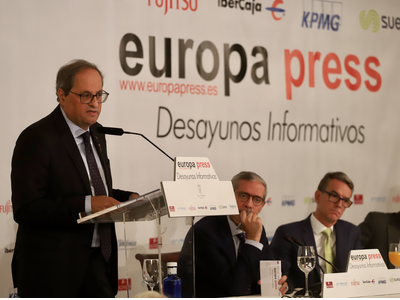- During the Desayunos Informativos de Europa Press, a conference held in Madrid, the head of the executive said: “There’s not a problem of social harmony in Catalonia; there’s a problem of democracy in Spain”
- President Torra warned: “Any sentence other than an acquittal will take us into a new stage, in which we will again seize the initiative and firmly embark on the path leading to independence”
- Torra said the latest proposal from Pedro Sánchez was a disappointment: “We cannot put our trust in him”

The president of the Government of Catalonia, Quim Torra, said today that the sentences soon to be handed down by Spain’s Supreme Court in relation to the 1 October referendum will “send a loud and clear message about the level of democratic quality of the Spanish state and its courts, how willing they are to accept political dissidence, and their respect for rights and freedoms that should be ensured in any modern country”. Speaking in Madrid at the debate platform Desayunos Informativos de Europa Press, Torra said: “It’s not only Catalans who are attentively awaiting the sentences; Europe and much of the world are also waiting to see what the court decides.” He stressed that the court decision would be a “watershed moment”.
The head of the executive said that just as the Constitutional Court ruling against Catalonia’s Statute of Autonomy “buried the constitutional pact”, any sentence other than an acquittal “will take us into a new stage, in which we will again seize the initiative and firmly embark on the path leading to independence”. The president said: “The citizens who voted for the politicians who’ve spent two years in preventive detention weren’t violent, and there was no incitement to violence. This is an emotionally unbearable falsehood for many people in Catalonia.”
Torra stressed: “We will once again exercise all the rights that we are denied. That’s a commitment I share with thousands of citizens. It’s my duty and I will act on that duty, regardless of fines, the risk of disqualification from public office, or other threats.”
The president argued that “there are some rights and liberties that take precedence over the law, over Spain’s harsh laws”, and said Spain must respect these principles “as its treaty commitments require”. Torra warned: “If Spain wants to be considered a democracy that respects and defends the rights of citizens, it must listen to all the voices that have been raised around the world calling for it to do just that.” The president cited a series of reports calling for Spain to change course: from the UN Working Group on Arbitrary Detention, Amnesty International, PEN International, and MPs and senators representing countries around the world.
Torra had a clear message: “As president, I will respond to the sentence by offering a way out for a society that doesn’t want to remain trapped in a state that doesn’t recognise its democratic will – a proposal based on the widest possible consensus among democrats in Catalonia, backing a programme that once again seizes the initiative and puts the objective of independence at the centre of political action.” He added: “I’m convinced that we won’t fail, that we’ll respond to the challenge in the only way possible, by joining forces in political action.”
“No problem of social harmony”
During his speech, the president denied that there was a problem of social harmony in Catalonia: “What there is, is a problem of democracy, of imposition, of the will of citizens being denied.” The head of the executive said: “Conflict arises when silence is imposed, not from the free expression of citizens’ voices. […] Who can be against citizens having the power to decide in a democracy? If Catalans can’t decide, that means we’re part of the Spanish state by imposition.”
The president insisted: “Catalonia intends to exercise power in a way that scrupulously respects the civil, political and social rights of its citizens.” He said he was convinced that “the Catalan people won’t accept any sentence other than acquittal, and as president, neither will I. Prosecuting and punishing those who exercise rights is incompatible with the exercise and defence of human rights, which is how we propose to live in Catalonia. Non-cooperation with injustice is a moral duty.”
According to Torra the state’s failure to make any move to address the Catalan political conflict and the imminence of the Supreme Court sentences are generating a “democratic confrontation”, which he defined as a “fight for civil, political and national rights, in the face of a state that refuses to engage in dialogue and uses repression, violence and threats to achieve its political objectives”. He stressed that this democratic confrontation “is always expressed in a non-violent, civil manner, following the example set by Catalan society in recent years, and this will continue to be the case in the future”.
The president said he regretted that this confrontation had not evolved into a “democratic understanding”, arguing that “an agreed, binding, internationally recognised referendum would have resolved the conflict”.
“In the new stage we’re about to enter in Catalonia, political action will focus on the right to self-determination and the exercise of that right, an approach that will be underpinned by a national programme.”
“No” to the investiture
The president criticised the Spanish government for breaking off talks aimed at finding a solution to the political conflict with Catalonia: “We remain at the negotiating table, waiting for a Spanish government, whatever its political stripe, to sit down and respond.”



